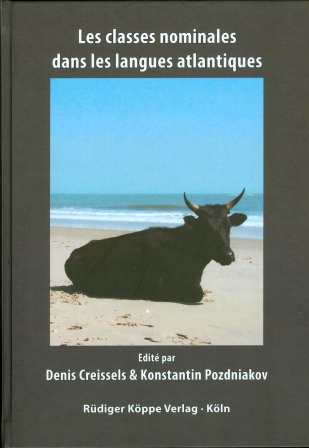


This book is the result of a five-year collaborative work within the framework of the ANR Sénélangues project under the direction of Stéphane Robert. The publication is about noun class systems in Atlantic languages, with a focus on Senegalese languages. There are about 60 Atlantic languages, whereby this book presents a quarter of them. The object of the work is to heighten the profile of non-documented or hardly documented Atlantic languages and to provide new research material of noun classes. Moreover, the publication describes noun class systems of Atlantic languages in Senegal synchronically.
Following Pozdniakov and Segerer, Atlantic languages are divided into two branches: the North-Atlantic and the Central-Atlantic branch. Chapters 3 to 7 describe the languages Keerak (Joola from Kabrousse), Bayot Kugere, Joola, Manjaku and Balant Ganja that belong to the Central-Atlantic group. In the second half (chapter 8 to 16), the North-Atlantic languages Palor and Ndut, Laalaa (Léhar), Kobiana, Nyun Gunyamolo, Nyun from Djifangho, Biafada, Sereer, Basari and Wolof are presented.
To simplify the comparison of data, the articles are arranged the same way. Every article begins with an introduction that includes some geographical and demographical information and comments on the current linguistic state of research of the respective language.
CONTENTS:
Denis Creissels / Konstantin Pozdniakov: Préface
Denis Creissels: Typologie des classes nominales dans les langues atlantiques
Konstantin Pozdniakov: Diachronie des classes nominales atlantique – morphophonologie, morphologie, sémantique
Guillaume Segerer: Les classes nominales en keerak (joola de Kabrousse)
Mbacké Diagne: Classes nominales en bayot kugere
Alain-Christian Bassène: Accords de classe et référence générique dans les parlers joola
Guillaume Segerer: Les classes nominales en manjaku
Séckou Biaye / Denis Creissels: Les classes nominales en balant ganja
Anna Marie Diagne: Le palor et le ndut – deux langues atlantiques sans classes nominales
El Hadji Dieye: Les classes nominales en laalaa (léhar)
Sylvie Voisin: Les classes nominales en kobiana
Sokhna Bao Diop: Les classes nominales en nyun gunyamolo
Nicolas Quint: Le système des classes nominales en nyun de Djifanghor
Alain-Christian Bassène: Les classes nominales du biafada
Marie Renaudier: Les classes nominales en sereer
Loïc-Michel Perrin: Les classes nominales en basari
Konstantin Pozdniakov / Stéphane Robert: Les classes nominales en wolof – fonctionnalités et singularités d’un système restreint
Under these links you will find publications by the contributors and a studybook of Pulaar, as well as descriptions of further West African languages featuring nominal class systems:
[…] this volume represents an overall valuable input to the description of Atlantic languages in general and to nominal classification therein in particular. lt not only covers little or undocumented languages, but also provides detailed studies of noun classes of these languages, including class marking on nouns and agreement targets, the semantic content of classes, and in some cases also the classification of loan words, verbal nouns, and generic nouns. This, together with the two synchronic and diachronic descriptions provided by the first two contributions, makes the current volume a significant resource for any further research on this topic.
Viktoria Apel in Afrika und Übersee, 93/2020, 327-331
© 2026 by Rüdiger Köppe Verlag – www.koeppe.de